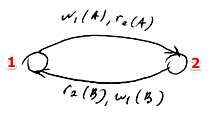Lock-Based Scheduler
This is a Scheduler that gives Conflict-Serializable Schedule
This scheduler is pessimistic:
- it assumes that something will go wrong, and it’s going to prevent that
Notation:
- $w(X)$ - write $X$
- $r(X)$ - read $X$
- $l(X)$ - lock $X$
- $u(X)$ - unlock $X$
Rule:
- before a transaction $T_i$ can read or write a database item $X$, it must obtain the lock on $X$
- if $T_i$ requests a lock that is already taken by other transaction $T_j$, it’s paused until $T_j$ releases the lock
- so it’s impossible for both $T_i$ and $T_j$ to have a lock on the same database element at the same time
Example
The following is a legal lock-based schedule:
| $T_1$ | $T_2$ | $l_1(A), r_1(A)$ | $w_1(A)$ | $l_1(B), u_1(A)$ | $l_1(A), r_2(A)$ | $w_2(A)$ | $l_2(B)$ | lock is denied, $T_2$ pauses | $r_1(B), w_1(B)$ | $r_1(B), w_1(B)$ | $u_1(B)$ | $T_1$ releases $B$, $T_2$ can proceed | $l_2(B), u_2(A)$ | $r_2(B), w_2(B)$ | $u_2(B)$ |
Another example:
$S = $ | $T_1$ | $T_2$ | $l_1(A), r_1(A), w_1(A), u_1(A),$ | || | $l_2(A), r_2(A), w_2(A), u_2(A),$ || | $l_2(B), r_2(B), w_2(B), u_2(B),$ || $l_1(B), r_1(B), w_1(B), u_1(B)$ | | Is it conflict-serializable?
- We build a precedence graph:
-
there is a cycle $\to$ no conflict serializability - so even if a lock-based schedule is legal, it doesn’t mean it’s conflict-serializable
Tho-Phase Locking
To get a conflict-serializable schedule:
- for each $T_i$, all lock requests $l_i$ must precede unlock requests $u_i$
In other words
- we can acquire as many locks as you want,
- but then can only unlock them without being able to acquire them again
- $\to$ cannot do $l_i(X), u_i(X), l_i(X), u_i(X)$ within the same transaction $T_i$
$\to$ all locks are released after the entire manipulation with a DB object is completed
- this way the schedule is guaranteed to be conflict-serializable
Theorem
A schedule $S$ obtained by Tho-Phase Locking is conflict-serializable
’'’Proof:’’’
Suppose we have a schedule $S$ in which a transaction doesn’t lock after unlocking
- we want to show that we can transform $S$ into a conflict-serializable one by conflict-free swapping
For a schedule with one transaction it’s trivial
- assume several transactions
Suppose we have the following schedule:
- $S = …, w_B(X), …, u_B(X), …, l_A(X), …, u_A(X), …, r_A(X), …$
- since $B$ unlocks $X$ there must be $l_B(X)$ that precedes $u_B(X)$
- in this case all actions for element $X$ are performed only by transaction $B$
- by conflict-free swapping can move all actions on $X$ to the front of the schedule
- then remove them and repeat for the remaining elements
$\square$
In Practice
- Transaction manager sends read/write requests
- The scheduler itself inserts locks and unlocks - the transactions don’t know anything about them
- Also the locks are usually released after commit
- so if a transaction $T_2$ waits for a lock, it will usually wait until another transaction $T_1$ that keeps the lock commits
Cons and Pros
- Locking is very effective when we have many transactions that both read and write
- When you have few transactions that write it’s not efficient - many transactions will have to wait for locks
Other Approaches
There are no problems with two transactions that read at the same time (as long as none of them write)
- there are different kind of locks for that
- Shared Locks - for reading at the same time
- Exclusive Locks - if you also want to write
Also there are hierarchical locks
- locks not on a tuple, but on the whole block
